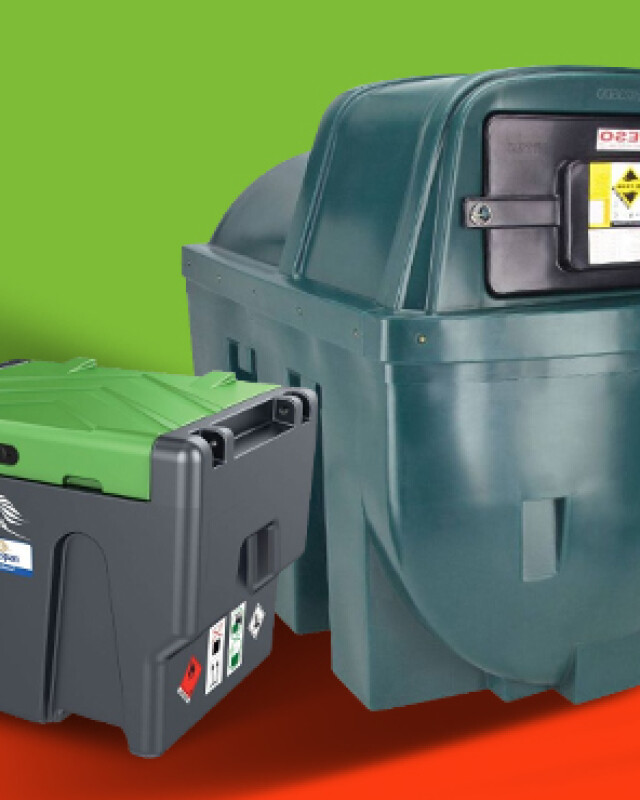- Oil
- Diesel
- Petrol
- AdBlue
- Water
- Sewage
- Hot Water Cylinders
-
Brands
- New Releases
- In Stock
- Sale
- Best Sellers
- Fuel Tank Hire
- More
-
Services
Our plastic diesel tanks
We provide products from industry-leading manufacturers including Harlequin, Deso, Atlas, Kingspan Titan and Swimer. All of our brands are OFTEC registered, with plastic fuel tanks having undergone rigorous testing to meet industry standards and European Trading regulations. With that said, you can rest assured that you'll only receive a premium quality plastic diesel tank when you shop with us here at Tanks R Us.
Our range of plastic fuel tanks are all constructed using medium density polyethylene plastic which means they won’t rust, corrode or form stress cracks from internal pressure. This makes them a brilliant choice when it comes to storing fuel effectively over time.
Benefits of plastic fuel tanks
What’s more, since diesel is a degenerative fuel that interacts with certain metals like mild steel, aluminium, and copper, using polyethylene tanks to store it removes the risk of fuel contamination or damage to the tank itself.
Polyethylene diesel tanks are suitable for many different industries from agriculture and mining to haulage and construction. Each tank is designed for a specific purpose, such as the bunded tank which provides pollution control by preventing chemical leakage and contamination with its double walled construction. Or, the single skinned tank, which is more appropriate for less risky environments.
Our plastic diesel tanks start small at 200 litres and go up to industrial scale capacity at 10,000 litres, making it easier for you to get the storage capacity you need with our large range of sizes available. Plus, they are effectively in the budget range and a cheaper, equally safe alternative to the more expensive steel diesel storage range. We also stock a variety of diesel tank accessories that allow you to get the best out of your plastic fuel tank.
FAQs
What Is A Diesel Dispensing Tank?
A diesel dispensing tank is a steel or plastic, bunded tank, designed for the purpose of storing and dispensing diesel fuel. Diesel dispensing tanks are manufactured with a range of accessories, such as a fuel pump, fuel hose, dispensing nozzle with automatic shut-off, flow meter, vent and lockable equipment access.
Can I Store Kerosene Or Petrol In A Diesel Dispensing Tank?
No, Diesel dispensing tanks should only be used to store and dispense diesel.
How Secure Are Diesel Dispensing Tanks?
All Tanks R Us steel or plastic diesel dispensing tanks are bunded meaning they have been designed to incorporate a ‘tank within a tank’ design. This protects your valuable fuel in the event of a tank split.
Furthermore, our diesel dispensing tanks are supplied with metal spigots, adjacent to the diesel tank’s access door, which are capable of accommodating a secure padlock.
Advanced diesel dispensing tank models can be supplied with fuel management systems, which mean that even in the event of a thief gaining access to the fuel cabinet, diesel cannot be dispensed without unique access keys to activate the fuel pump.
What Do I Do If I Find Water In My Diesel Tank?
The presence of water within your diesel tank and indeed, within your diesel, is common. This builds up as a result of climate changes which occur over time. Tanks R Us are able to remove any water from your fuel. Simply contact us to arrange a visit from one of our technicians.
You can also take preventative measures in reducing or eradicating the presence of water in your diesel tank or your fuel. A Cim-Tek tank dryer, which is made from fabric and sits within your diesel tank, can collect water over time. Simply check and replace it regularly to keep water levels at a minimum.
Furthermore, purchasing a water filter with your diesel tank will ensure that even if water is present in your diesel tank, it will not filter through to your vehicles fuel tank. We strongly recommend purchasing a water and particulate filter with all diesel tanks, by way of protecting your vehicles from damage.
Do Diesel Dispensing Tanks Require Power?
Yes, A standard 13 amp, single phase mains power supply is required to operate diesel dispensing tanks. All mains electrical installation work should be carried out by a qualified and accredited technician and should never be carried out by unqualified persons. Mains electrical installations should also be inspected on a regular basis, in line with relevant regulations.
Help
About Us
My Account
Newsletter Sign Up
Inspiration direct to your inbox, please enter your email below...
Help About Us My Account
© Tanks R Us. All rights reserved. Registered in England. Registration number. 05804332. VAT number 364402764
Designed and produced by Kal Group
